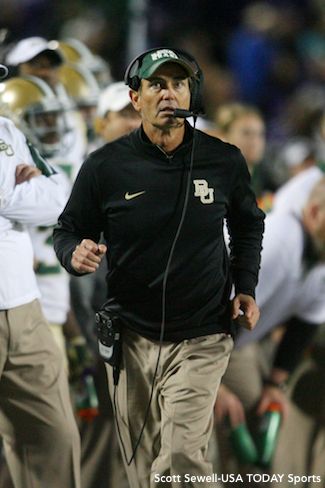What's the old adage that says if it's too good to be true, it probably is? That applies absolutely to college football, with regard to its nouveaux riches.
We just witnessed the implosion of Baylor's program after it was discovered that it had been sweeping serious sexual-assault allegations under the rug for several years. This followed months-long investigation of Ole Miss and its various NCAA violations that reached a crescendo on NFL Draft night when Laremy Tunsil admitted that he took money from the school's football staff.
What do these two programs have in common? They were both college football's ne'er do wells that were transformed into national powerhouses overnight. Their ascent in the sport's hierarchy was sudden and stunning, but always viewed with suspicion.
For good reason, it turned out.

Before Art Briles' arrival in Waco, Baylor has had exactly one 10-win season in more than 100 years of playing football. It was always a minnow in the old Southwest Conference before barely squeezing into the Big 12 in 1996. Grant Teaff, who averaged a 6-5 record and won the conference title twice in his 21 years, was considered the patron saint of the program.
Enter Briles, a wildly successful Texas high school coach with a penchant for offensive innovation. Until he was fired last Thursday, Briles had racked up six consecutive winning seasons at Baylor, including four 10-win campaigns. He mentored the school's first Heisman Trophy winner in Robert Griffin III and was instrumental in getting the $266 million McLane Stadium built on campus in 2014.
Ole Miss' history is only slightly different. The Rebels were a powerhouse program in the '50s and early '60 under Johnny Vaught in the segregated South. They came close to winning the national championship three times and went to a bowl game in 15 consecutive seasons -- no mean feat considering that there were only a handful of bowls every year at that time.
But that's ancient history. Until Hugh Freeze arrived in 2012, the Rebels last had a 10-win season in 1971. Just like Briles, Freeze is a former high school coach who nearly instantly transformed the program. He reeled in top recruits and turned Ole Miss into a formidable presence in the cut-throat SEC West. The Rebels beat Alabama in consecutive seasons in 2014 and '15 and made it to a New Year's Six Bowl game in each.

It is now obvious that neither program was able to find such sudden success without cutting corners. At Baylor, it was shielding players with questionable character even in the face of serious allegations. At Ole Miss, it was rampant NCAA violations that include (but not limited to) providing players impermissible benefits and arranging for fraudulent ACT tests.
To be sure, these are not the first nor will be the last schools to sacrifice principles for instant glory. For the also-ran programs in the Power 5 conferences, there's too much money in college football and the temptation is too great. There will be others who decide to risk the consequences by taking a shortcut.
What happens next will somewhat depend on what happens now to these two programs.
By firing Briles, Baylor has decided that it must risk blowing up the football team to save whatever integrity is left of the Christian private school. It has already lost recruits and it likely will experience at least one season of turmoil as an interim staff is running the team for 2016. Long-term, the Bears may very well return to irrelevance as they were pre-Briles.
Ole Miss, on the other hand, decided to self-impose laughably lenient penalties that include no postseason bans and a reduction of only 11 scholarships over four years. Check that -- it did impose a postseason ban, but it's on the women's basketball team.
If the NCAA accepts this farce, then cheating at major conference football program not only won't be curbed, but will proliferate. In 2012, Miami was hit with a nine-scholarship reduction over three years after having self-imposed a two-year bowl ban. It would be unthinkable that the Rebels would be allowed to carry on without some sort of postseason sanctions.
Even with harsh penalties after the fact, the scourge of improprieties in big-time college athletics will never be eradicated. The only way for foul play to occur less often is if the people who run these universities -- the presidents and administrators -- clearly understand what is the mission of their institutions and act accordingly.
Don't let the tail wag the dog.
More By Samuel Chi:
-- College Football Fan Bases Most Obsessed With Their Rival
-- Reversal On Satellite Camps Is Win For Players, Trouble Sign For NCAA
-- College Football Leadership Lacks NFL's Business Sense
-- Samuel Chi is the managing editor of RealClearSports.com and proprietor of College Football Exchange. Follow him on Twitter at @ThePlayoffGuru.





